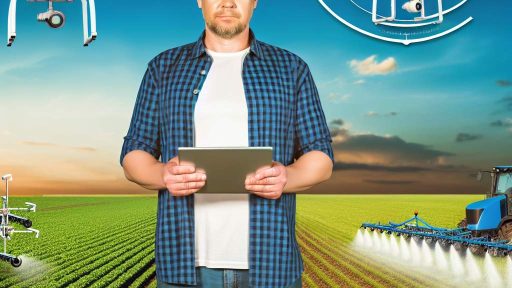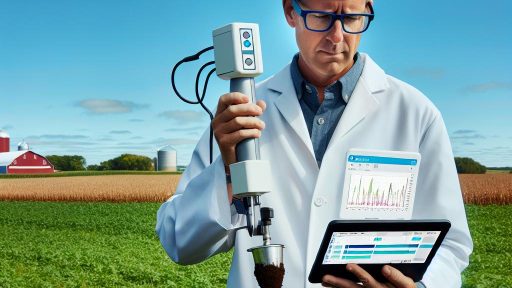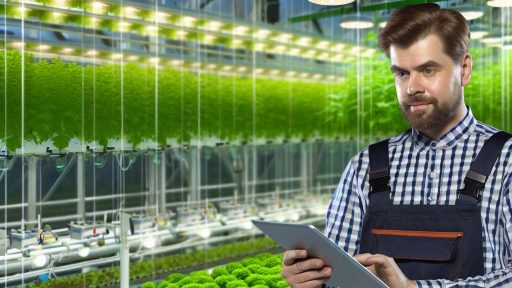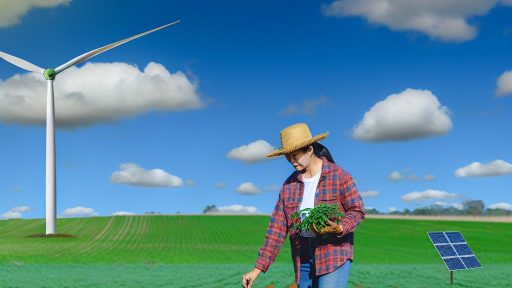Introduction to Blockchain Technology and Its Relevance to Agriculture
Blockchain technology revolutionizes many industries, including agriculture.
This innovative technology ensures transparency and traceability in supply chains.
Farmers benefit greatly from increased visibility into their product’s journey.
Additionally, blockchain enhances trust between producers and consumers.
Understanding Blockchain Technology
Blockchain is a decentralized digital ledger that records transactions securely.
Every transaction is linked and stored across multiple computers.
As a result, this system is nearly impossible to alter or falsify.
Transparency is built into the blockchain, allowing all participants to verify data.
Importance of Transparency for Farmers
Farmers face challenges related to supply chain opacity.
They often lack insight into the distribution processes of their goods.
With blockchain, farmers gain real-time access to data regarding their products.
This transparency helps them ensure quality and compliance with safety standards.
Benefits of Blockchain in Agriculture
The application of blockchain in agriculture offers several significant advantages.
- Improved traceability of products from farm to consumer.
- Enhanced accountability across the supply chain.
- Reduction in fraud and misinformation.
- Greater efficiency in logistics and operations.
These benefits collectively empower farmers to make informed decisions.
Moreover, they strengthen their relationships with customers and distributors.
Transform Your Agribusiness
Unlock your farm's potential with expert advice tailored to your needs. Get actionable steps that drive real results.
Get StartedReal-World Applications of Blockchain
Various organizations are implementing blockchain solutions in agriculture.
For example, IBM’s Food Trust platform ensures food safety by tracking products.
Another instance is Provenance, which focuses on traceability for ethical sourcing.
These initiatives demonstrate the vast potential of blockchain technology.
Farmers can embrace these advancements to enhance their operations.
Challenges in Current Supply Chain Transparency for Farmers
Lack of Visibility
Farmers face significant challenges in understanding their supply chain.
Many processes remain hidden from producers.
This lack of visibility creates trust issues with consumers.
Furthermore, it complicates the ability to trace products effectively.
Data Integrity Issues
Farmers struggle with data accuracy within their supply chains.
Inaccurate information can lead to poor decision-making.
Additionally, it may result in food safety concerns.
Trusting data from multiple stakeholders becomes difficult.
High Operational Costs
The current supply chain systems often incur high operational costs.
Farmers frequently bear expenses associated with inefficient practices.
These costs reduce profit margins significantly.
Moreover, complex systems can confuse even the most experienced farmers.
Fragmentation of Systems
Supply chains often consist of multiple fragmented systems.
This fragmentation complicates seamless communication.
As a result, farmers may miss critical information.
Consequently, this situation affects overall productivity and efficiency.
Barriers to Technology Adoption
Farmers encounter barriers when adopting new technologies.
Financial constraints can limit their ability to invest.
Additionally, there may be insufficient training resources available.
Showcase Your Farming Business
Publish your professional farming services profile on our blog for a one-time fee of $200 and reach a dedicated audience of farmers and agribusiness owners.
Publish Your ProfileThis limits their understanding of advanced systems.
Consequently, outdated practices may persist.
How Blockchain Technology Works: A Simplified Overview
Defining Blockchain Technology
Blockchain technology is a digital ledger system.
It records transactions across multiple computers.
This ensures that transactions remain secure and immutable.
Components of Blockchain
A blockchain consists of several key components.
These include blocks, chains, nodes, and miners.
Each block contains a set of transaction records.
These blocks link together, forming a chain.
Nodes are individual computers that maintain the blockchain.
Miners verify and add new transactions to the chain.
How Transactions Are Processed
When a transaction occurs, it gets grouped into a block.
Miners then validate this block through mathematical challenges.
Once confirmed, the block is added to the chain permanently.
This process requires consensus among the network participants.
Enhancing Transparency
Blockchain offers transparency for all transactions recorded.
Farmers can trace their products throughout the supply chain.
Additionally, consumers gain access to the entire history of products.
This transparency builds trust between farmers and consumers.
Decentralization: A Key Feature
Decentralization is another important aspect of blockchain.
No single authority controls the entire network.
This reduces the risk of fraud and manipulation.
Decentralization also enhances security and reliability.
Benefits for Farmers
Farmers benefit from blockchain technology in various ways.
- They gain access to real-time data on market trends.
- They can improve inventory management through tracking.
- Payment processing becomes faster and more secure.
Furthermore, farmers experience a reduction in operational costs.
You Might Also Like: Integrating Biotechnology With Traditional Farming Methods
Case Studies: Successful Implementation of Blockchain in Agriculture
Introduction to Blockchain in Agriculture
Blockchain technology is revolutionizing agricultural practices.
Farmers are gaining new tools to enhance transparency.
This technology offers a secure and efficient way to track produce.
Case Study: IBM Food Trust
IBM Food Trust is a notable case of blockchain application.
This platform connects farmers, suppliers, and retailers.
Each participant gains visibility over the supply chain.
For example, Walmart utilizes this system for food safety.
It allows them to trace the origin of their products quickly.
In 2019, Walmart reduced its food traceability time from weeks to seconds.
Case Study: Provenance
Provenance focuses on transparency in seafood supply chains.
This company collaborates with fisheries around the globe.
They ensure that consumers know where their seafood comes from.
Blockchain verifies each step in the supply chain.
As a result, customers gain trust in the products they purchase.
Showcase Your Farming Business
Publish your professional farming services profile on our blog for a one-time fee of $200 and reach a dedicated audience of farmers and agribusiness owners.
Publish Your ProfileCase Study: AgUnity
AgUnity supports smallholder farmers through blockchain technology.
Their platform facilitates record-keeping and transactions.
Farmers can track their harvests and sales digitally.
By doing so, they enhance their access to markets.
This solution helps improve overall productivity and income.
Case Study: Carrefour
Carrefour employs blockchain for tracking food transparency.
They use it to trace chicken and other perishable products.
This traceability reassures consumers about product quality.
With QR codes, customers can access detailed product histories.
Such initiatives foster greater consumer confidence in Carrefour.
Benefits of Blockchain for Farmers
Farmers benefit from blockchain technology in multiple ways.
Firstly, they achieve greater transparency in transactions.
This visibility helps establish trust with consumers.
Secondly, blockchain reduces paperwork and administrative burdens.
Thirdly, it protects against fraud and ensures fair pricing.
Future Prospects
Looking ahead, blockchain technology will continue to evolve.
More farmers are expected to adopt these solutions.
This trend is likely to enhance global food security.
As a result, consumers will enjoy higher quality agricultural products.
Ultimately, blockchain serves as a bridge between technology and agriculture.
See Related Content: Implementing Drone Technology On Modern Farms
Benefits of Blockchain for Farmers
Enhanced Transparency and Trust
Blockchain technology significantly enhances transparency in the supply chain.
This improved visibility fosters trust between farmers and consumers.
Every transaction is recorded on a secure and immutable ledger.
Consequently, farmers can prove the authenticity of their products.
Consumers appreciate knowing where their food comes from.
They feel more confident buying directly from transparent sources.
This transparency can lead to increased customer loyalty.
Real-Time Tracking of Products
With blockchain, farmers can track their products in real-time.
This reduces the chances of fraud and misrepresentation.
By accessing real-time data, farmers can make informed decisions.
This capability streamlines inventory management processes.
Ultimately, this leads to more efficient operations.
Farmers can respond quickly to market demands.
Streamlined Transactions and Payments
Blockchain simplifies transaction processes for farmers.
It eliminates intermediaries, enabling faster payments.
This technology reduces transaction costs significantly.
Farmers receive their earnings promptly, improving cash flow.
Additionally, smart contracts automate payments upon delivery.
This ensures timely and accurate compensation for their products.
Showcase Your Farming Business
Publish your professional farming services profile on our blog for a one-time fee of $200 and reach a dedicated audience of farmers and agribusiness owners.
Publish Your ProfileReducing Fraud and Food Safety Risks
Blockchain helps in reducing fraud in the supply chain.
Farmers can verify the origin of products easily.
This capability enhances food safety measures across the board.
In case of contamination, tracing the source becomes straightforward.
Consumers can make healthier choices based on transparency.
As a result, farmers build a reputation for quality and safety.
Explore Further: Choosing The Right Agricultural Drone For Your Farm
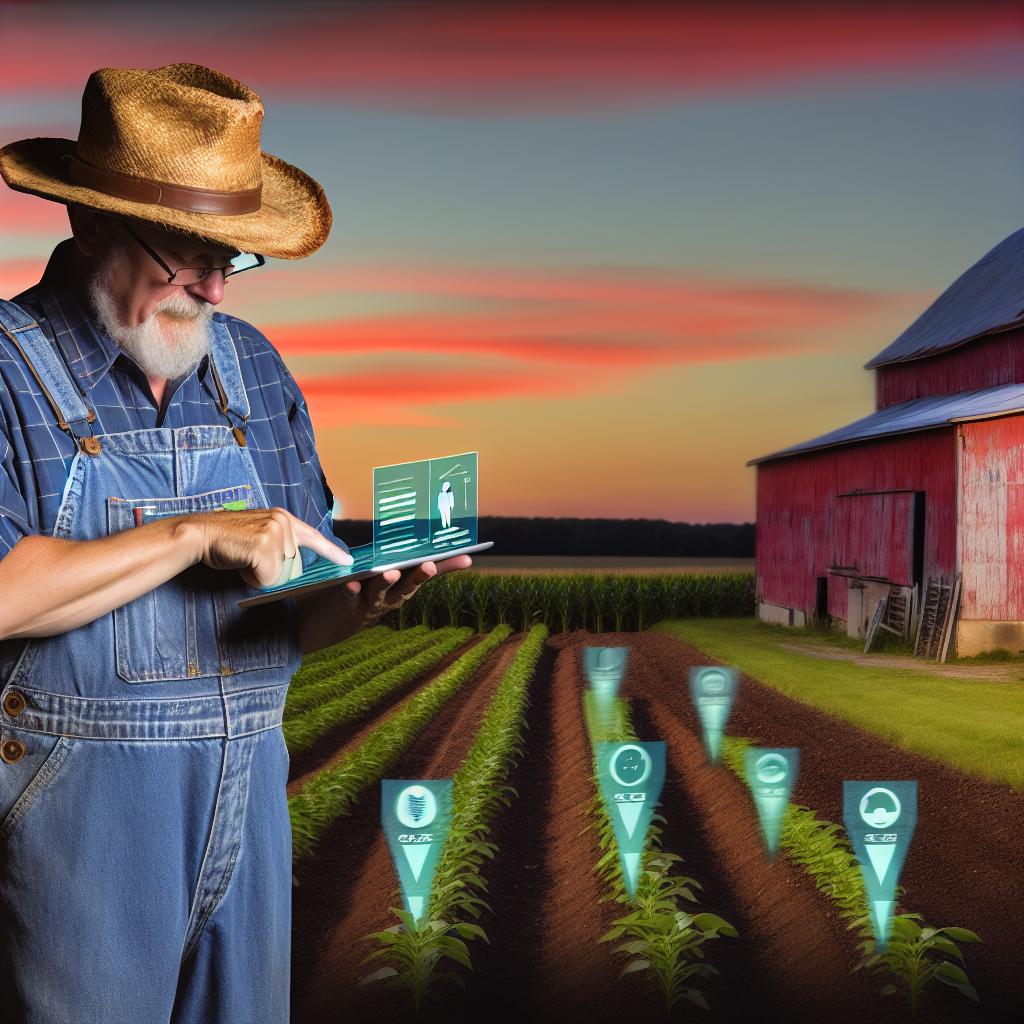
Impact of Blockchain on Traceability and Food Safety Standards
Enhancing Traceability
Blockchain technology significantly improves traceability in supply chains.
Farmers can track their products from farm to table.
This transparency helps in identifying the origin of food products.
Therefore, consumers gain more confidence in the food they purchase.
Moreover, blockchain records each transaction securely and immutably.
This feature minimizes the potential for fraud in food supply chains.
It also allows for quick resolution of any food safety issues.
Improving Food Safety Standards
Blockchain enhances food safety standards across industries.
It promotes compliance with regulations and best practices.
Data recorded on the blockchain can be accessed in real time.
This access provides instant updates on product recalls, if necessary.
Furthermore, retail partners can verify the quality and safety of products.
As a result, fewer foodborne illness outbreaks occur.
Building Consumer Trust
Transparency is essential for building consumer trust.
Blockchain empowers consumers with information about product sources.
They can learn about farming practices and ingredient origins easily.
This knowledge fosters a stronger connection with food producers.
Additionally, consumers are more inclined to support ethical and sustainable brands.
Collaborating Across the Supply Chain
Collaboration among stakeholders is crucial for effective implementation.
Farmers, distributors, and retailers need to work together seamlessly.
Blockchain facilitates shared access to crucial data among these parties.
By using a common platform, everyone stays informed and aligned.
Such coordination enhances overall efficiency and safety in the supply chain.
See Related Content: Training Your Team To Use Farm Management Software Effectively
Integration of IoT with Blockchain for Real-Time Supply Chain Monitoring
The Role of IoT in Supply Chain Management
The Internet of Things (IoT) revolutionizes supply chain management.
It connects devices, enabling real-time data collection.
Farmers can track agricultural products from the field to the market.
This connection enhances transparency and efficiency.
Blockchain as a Secure Data Storage Solution
Blockchain technology provides a decentralized data storage option.
It ensures all transactions are immutable and traceable.
This feature builds trust among all stakeholders in the supply chain.
Real-Time Data Sharing Between Farmers and Retailers
Real-time data sharing is critical for supply chain transparency.
Farmers can access real-time information about market prices.
Showcase Your Farming Business
Publish your professional farming services profile on our blog for a one-time fee of $200 and reach a dedicated audience of farmers and agribusiness owners.
Publish Your ProfileThey can make informed decisions about when to sell their products.
Retailers benefit from timely updates on stock levels.
Case Studies Demonstrating Successful Integration
Several companies illustrate successful IoT and blockchain integration.
AgriChain utilizes IoT sensors to monitor crop health.
The data is recorded on a blockchain to prevent tampering.
Farmers using this system report higher profits.
Challenges Farmers Face in Implementation
Despite its benefits, implementation poses challenges for farmers.
The initial cost of technology can be high.
Additionally, farmers may require training to use new systems.
Overcoming these challenges is essential for successful adoption.
Future Trends: The Role of Blockchain in Sustainable Farming Practices
Enhancing Transparency in Supply Chains
Blockchain technology fosters transparency throughout agricultural supply chains.
This innovation enables farmers to track products from farm to table.
Ultimately, it helps consumers understand the origin of their food.
In fact, transparency builds trust between farmers and consumers.
Improving Traceability of Products
With blockchain, every transaction is securely recorded on an immutable ledger.
This feature enhances the traceability of products, allowing for quick responses to issues.
For example, if a product is contaminated, farmers can trace it back to its source.
As a result, this minimizes the impact of recalls on the entire supply chain.
Encouraging Sustainable Practices
Blockchain can also incentivize sustainable farming practices.
Farmers who use eco-friendly methods can receive verified certifications.
This approach benefits those committed to sustainability and attracts conscious consumers.
Furthermore, it encourages others to adopt similar practices.
Facilitating Access to Funding
Farmers can use blockchain to access funding more easily.
Blockchain smart contracts streamline loan processes for farmers.
Additionally, they can prove their farming practices through the technology.
This capability makes it easier for lenders to assess risks.
Connecting Farmers to Markets
Blockchain facilitates direct connections between farmers and consumers.
This direct link eliminates intermediaries, increasing profits for farmers.
Moreover, it allows consumers to purchase fresh produce directly from farms.
In essence, this enhances economic opportunities for local farmers.
Future Innovations on the Horizon
Blockchain technology continues to evolve, offering new possibilities.
Innovations in integration with IoT devices can further enhance its potential.
For instance, sensors can provide real-time data on crop health.
Consequently, this data can be recorded to the blockchain for analysis.
Additional Resources
Antecedents for blockchain technology-enabled sustainable …
Blockchain and agricultural sustainability in South America: a …

